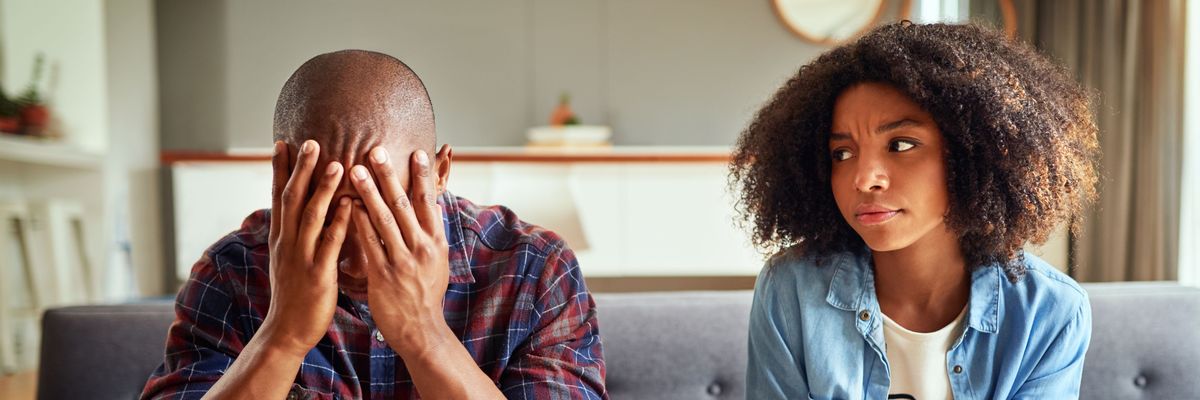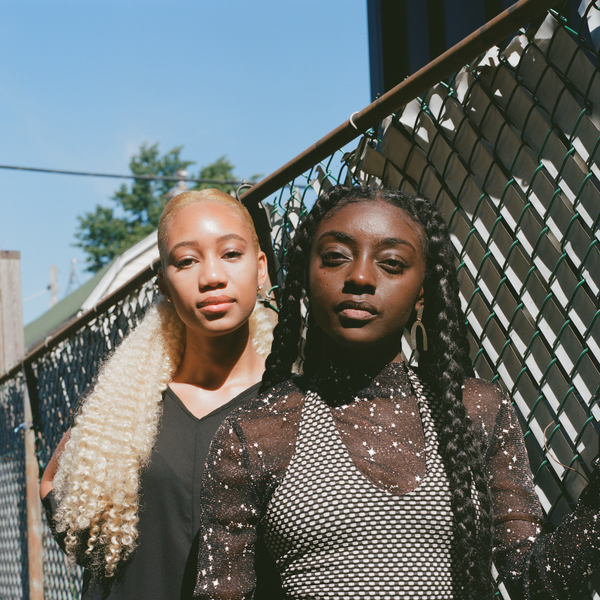
When it comes to the fashion world, there's no denying the direct influence and contribution of Black women.
Although recognition and credit tend to go unsaid, the simple truth is: Black women are the blueprint. As the tides shift within the industry, the true measure of sustainable progress will be weighed by how well the new class of designers and emerging brands are embraced and amplified. However, it's important to note that this isn't a request for permission: this is an announcement. Black designers aren't waiting for a chance for their stories to be told, they're letting their brands speak for themselves. And if you truly want to know where the future of fashion is headed, you must first tap into the rising voices who are creating history today.
Meet Sadé Lewis and Shaniya Charles, the design duo behind the self-titled fashion and lifestyle brand, Sadé + Shaniya. When the two Brooklynites met in their high school English class, their bond was formed over their shared interest in extracurricular activities, like Modeling Club and their desire to dissect the ambiguity of the industry they aspired to break into. As Sadé shares, "I feel like we align on things that we didn't like about the fashion industry and how it real mysterious and superficial, as well as not really seeing people that looked like us at the forefront."
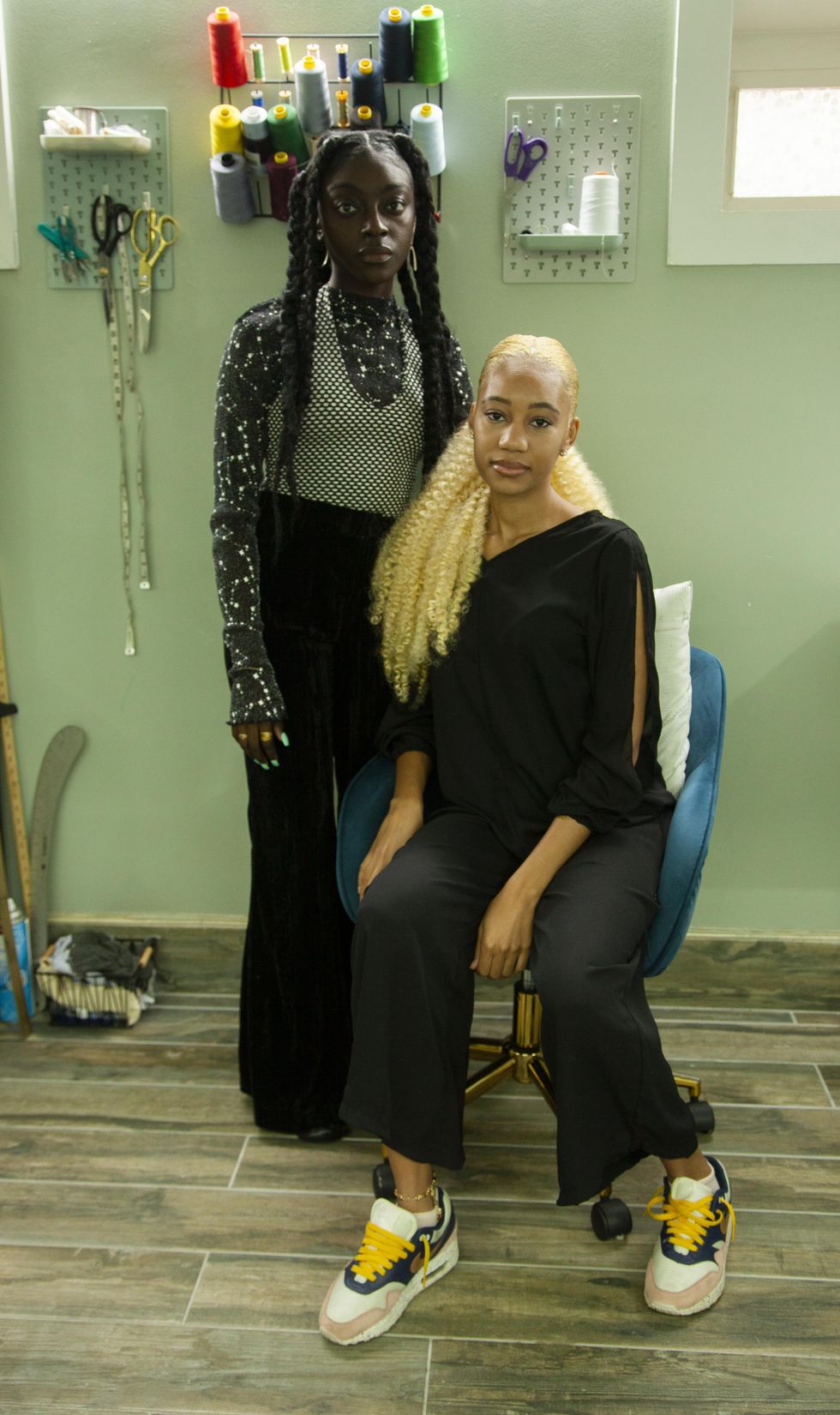
Shaniya Charles, left. Sadé Lewis, right.
Photo Credit: Pia Fergus
As graduates of the prestigious Fashion Institute of Technology, FIT, the pair have been able to combine their talents beyond the textbooks, weaving their story into the fabric of their take on accessible high fashion and ready-to-wear pieces. Drawing inspiration from their personal journey, Black culture, and womanhood, the complex and nuanced experience that Black women share serves as a natural muse for everything they put their hands to.
Their signature design, the Mora Bag, tells a story of the duality of Black womanhood that serves as a stylish and metaphorical reminder to pack light and be light. "The color palettes that we looking into were [colors] that would trigger us to be soft and more vulnerable. There's always the notion that the Black woman is hard, she's strong, and she can do all these things. And she can, but she also has to step into the power of being vulnerable, being open, and being able to feel like you can release," Shaniya shares.
When the innovation of two Black women joins forces, there's no limit to the possibilities that they can unleash. Luckily, xoNecole has a front-row seat to the beginning stages of these dynamic designers, destined to dominate the fashion world on their own terms.
xoNecole: As Black women, sometimes we don't always have control over our narratives. With storytelling being such a huge part of you all’s design process, how does Black womanhood play the role of muse for you two?
Sadé Lewis: The origin of our collections, everything is based off a real story or feeling. For example, The Looking Glass [collection] was very much about looking yourself in the mirror and seeing this multifaceted person. You don't have to fit into one version of yourself, or one version of what people think you should be, you are many things. So that was our individual journey during that time. Literally, accepting us being women who can be everything at once, you know? It definitely always comes from something that we're going through. We don't try to pressure ourselves to create timing. It just comes when it comes. And yeah, it's always from within us, navigating our own lives, then figuring out how can we make a physical manifestation of how we feel.
Shaniya Charles: We also grab inspiration from the woman that we talk to, the people that we deal with on an everyday basis, and the majority of them are Black women. We try to make sure that we're telling their stories as well. Although it's our narrative, we want to make sure that our consumers are connecting to what we're putting out and feel or see themselves in what we are creating.
Sadé Lewis: As Black women, we want to be safe, we want to be able to control our narratives and our lives. This brand for us isn't just popularity. It's so we can have the freedom to be our absolute selves and create how we want to create, tell our story how we want to tell our story, and live how we want to live - and be an avenue for other people to do the same. The overall goal is to be able to support other women and other creatives in their endeavors.
"As Black women, we want to be safe, we want to be able to control our narratives and our lives. This brand for us isn't just popularity. It's so we can have the freedom to be our absolute selves and create how we want to create, tell our story how we want to tell our story, and live how we want to live - and be an avenue for other people to do the same. The overall goal is to be able to support other women and other creatives in their endeavors."
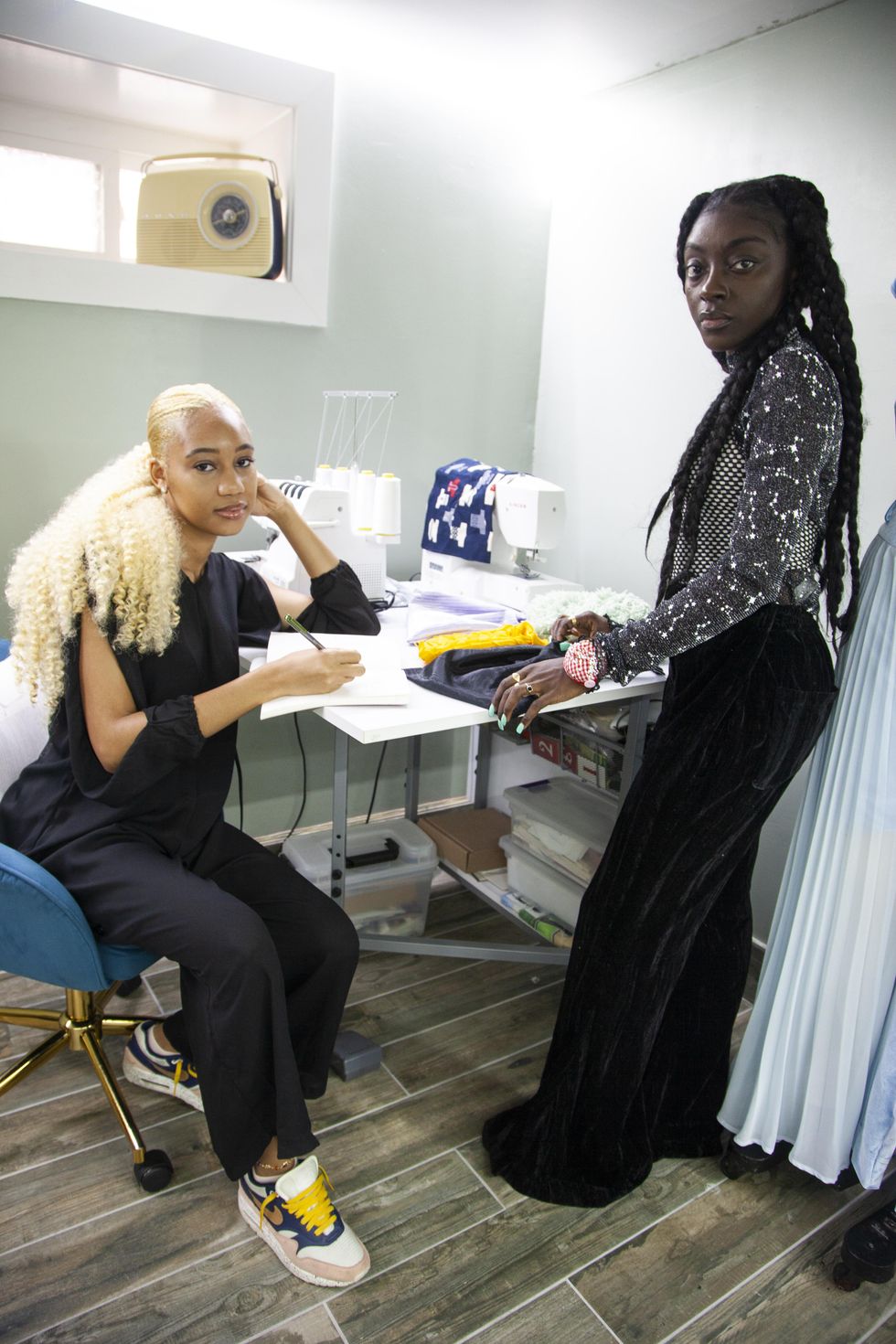
Photo Credit: Pia Fergus
Let’s get into your short film which premiered on the Council of Fashion Designers of America (CFDA)! That was you all’s first short film too. What was the inspiration behind the 'Green Eyes'' story?
Shaniya: First and foremost, we both love Erykah Badu! Green Eyes is one of our favorite songs. Sadé was listening to the song in the shower. And she came out and she was like, "I have an idea. We're going to create a visual fashion show based on this!" From there, we just started planning out what we wanted the story to be, the garments we would create for it, and how that would be an introduction to our actual collection that was coming up. We partnered with a Black woman to create the film; we wanted to make sure that although it's our story, that the people involved in it were also authentic and Black.
Sadé: That shower moment was literally me listening to the song. It almost felt like I was in a trance. There's no visual for that song, so it was just me envisioning alone and in a way pleading to this man. When it comes to communication between a man and a woman, sometimes it's just not there. We have egos and pride. The story that Erykah was telling was a matter of pride. It's not time to put your pride out there when you really feel this is your person. This is your soulmate, but your pride is literally ruining everything.
It was really cool to work with the director, Kyra Andrews. She has a theme about her work where she does love stories and Black romance shorts. It was really cool to tell her about our ideas and how we connect to the song and see how she could visually support that the film. It was very hands-on for all of us, even the actors in the film. We did it in one day, in the middle of a snowstorm, but it was really fun. Seeing the end result was like, wow.
As two Black women and emerging designers, I’m sure there have been obstacles that you’ve had to overcome through your trajectory. What are some of the challenges that you all experienced starting out?
Sadé: This is an industry that in all honesty, a lot of the cultural, creative, and artistic design aspects do come from Black people - we are at the forefront of a lot of those things. It's also hard as women to be respected and to be taken seriously. I don't know when those challenges will ever end for our people. So when things get hard and we might feel like our message is not getting across or things didn't perform as well as we want it to, we do have each other to remind us why we're here and that we're in it for the long run; we're not in it to be a quick trend.
You both have been friends for over a decade. How has it been working together while maintaining your friendship? How do you all make it work?
Shaniya: Our communication has always been at the forefront. From high school, we've always been very honest with each other. We make sure that we are each others' open and safe space. Even if something's bothering me, or something's bothering her, we try our best to communicate that. And I think the communication aspect and comfortability that we both have in each other allows us to explore different avenues of friendship and business partnership.
Sadé: We don't really have much of a system in place because I know it's important to separate business from friendship; it's not much a strict structure. But I think the both of us know when it's time to talk business and just time to just be friends. We have a good sense of understanding each other's needs. Just having that grace for each other and knowing when to read the room.
"I think the both of us know when it's time to talk business and just time to just be friends. We have a good sense of understanding each other's needs. Just having that grace for each other and knowing when to read the room."
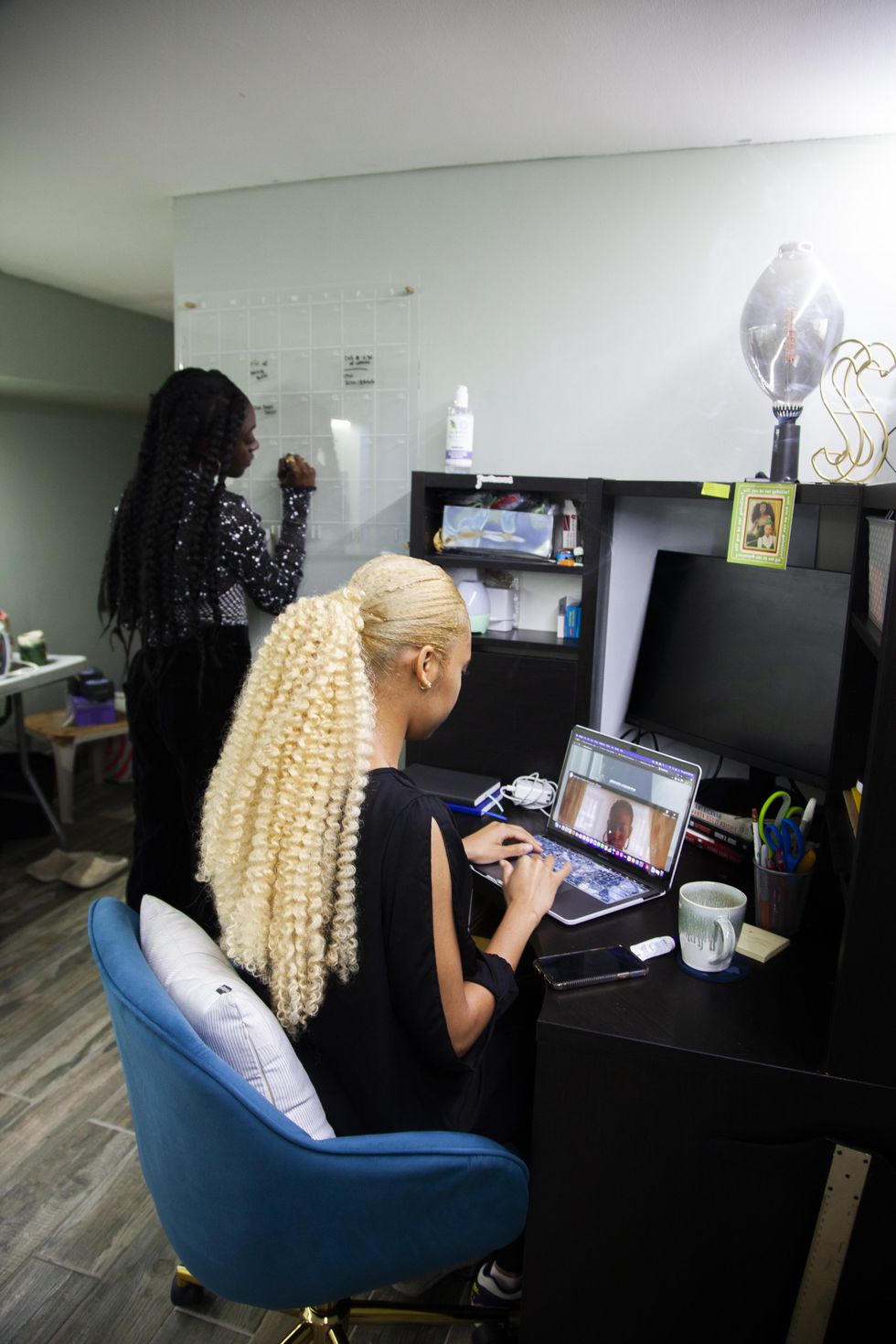
Photo Credit: Pia Fergus
The whole “networking across” concept that Issa Rae famously coined has really become a collective mindset for many creatives. For those who are looking for their creative partner-in-crime, what are some tips that you would give to finding one successfully?
Sadé: I would say, be open and honest about your needs. I think a lot of times when people are doing something creative, or looking for a service, they go to Google and type in, "Photographers. NYC." And it's like, you might know someone from your high school or your college who's into photography. I think we have to have more of a mindset of working together. If we all came together with our respective interests, we could be so powerful.
It's not necessarily always about looking up to these big names. Because a lot of the time, they're not going to have the same respect. Or uphold your ideas and your project to the same reverence as someone who is grinding just like you. And then you'll learn who you can really build with. Just be open to the people around you and what they can offer.
Shaniya: Be authentic to who you are. It's a lot of pressure and there's a lot coming at you at once in terms of being creative, but I feel like you should just be authentic to who you are. If you like photography or design, you'll align with the people that you're supposed to align with. We have so much pressure around us now from social media and a whole bunch of different outlets saying, you should do this, you should do that. But just be authentic and true to who you are as a person. And whatever is supposed to align with you and the people that you are supposed to meet will come your way and those relationships will foster and grow to be what you need them to be.
"It's not necessarily always about looking up to these big names. Because a lot of the time, they're not going to have the same respect. Or uphold your ideas and your project to the same reverence as someone who is grinding just like you. And then you'll learn who you can really build with. Just be open to the people around you and what they can offer."
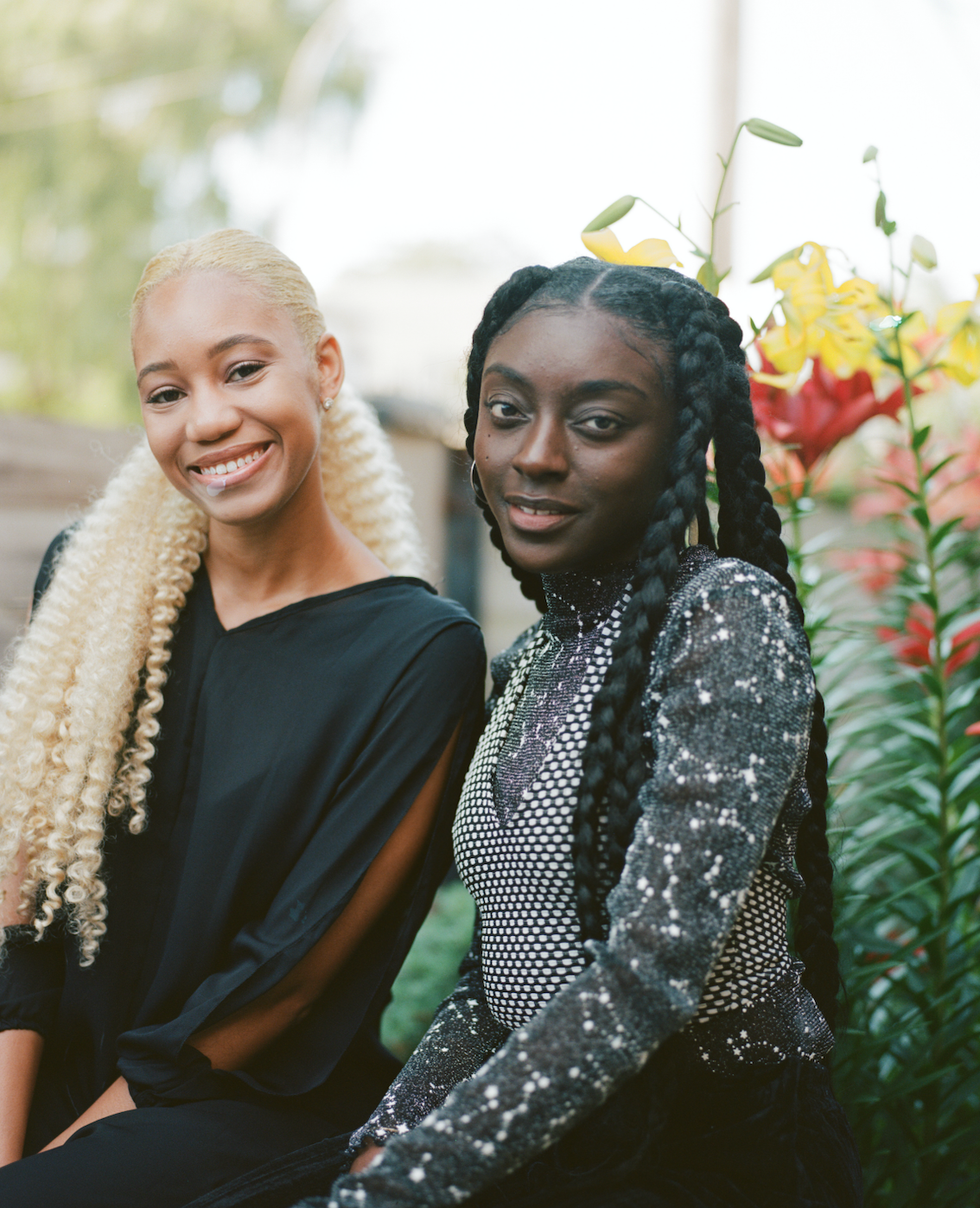
Photo Credit: Pia Fergus
It’s really encouraging to hear that you all are able to lean on each other through the ups and the downs of your journey. Is there anything that you all tell each other to keep each other motivated?
Sadé: We have these little moments where we'll just go to each other and we'll be like, "Girl, you the sh*t." Or, "Wow, you really my best friend, you a bad b*tch." Stuff like that. Also, because we put a lot of storytelling and meaning behind our collection, we use that to align ourselves. This work comes from a place within.
It's always from a place based on the story that we're telling and our experiences together. I feel like that is our anchor; reminding each other that you're creating from a real place. And also, we both come from the fashion industry. We studied it in college and we also work in it. It's like, you really know what you're doing. Just trust yourself and keep going.
To stay connected to Shaniya and Sadé's upcoming collection, and cop a Mora Bag of your own, click here.
Featured image courtesy of Sadé + Shaniya
This Is How To Keep 'Holiday Season Stress' From Infecting Your Relationship
Hmph. Maybe it’s just me, but it seems like there is something really weird happening in the fall season air (because winter doesn’t officially begin until December 21) that cuddle season is in full swing while break-up season is as well. In fact, did you know that break-ups are so popular during the holiday season that December 11 is deemed Break-Up Day?
The reasons why relationships shift around this time vary; however, I did both roll my eyes and chuckle when I read that a very popular one is because it’s an easy way to get out of getting one’s significant other a Christmas present. SMDH.
Anyway, I personally think that the less shallow folks out here may contemplate calling things “quits” or they at least distance themselves a bit from their partner (and what I’m referring to is serious relationships) due to all of the stress and strain that oftentimes comes with the holidays whether it be financial, familial, due to their tight schedules or something else.
Listen, I would hate for you and your man to miss the fun and happiness of experiencing this time of year, all because you are so overwhelmed or irritated that you can’t really enjoy it. That’s why I have a few practical tips for how to avoid allowing the typical holiday season stress from INFECTING your relationship.
Manage Your Expectations
 Giphy
GiphyUnmanaged expectations. If there is a main reason why the holiday season tends to be so stress-filled for so many people, I’d bet good money that this is the cause. And when you’re in a long-term relationship, expectations can manifest themselves in all sorts of cryptic and/or unexpected ways. You might have relatives who assume that you are going to be with them for Thanksgiving or Christmas when you have other plans in mind. You might be thinking that you are going to spend one amount for presents while your man is thinking something totally different. When it comes to scheduling, your signals may be crossed.
And you know what? To all of these scenarios, this is where clear and consistent communication come in. Don’t assume anything. Don’t dictate anything either. From now until New Year’s, mutually decide to check in once a week, just to make sure that you are both on the same page as it relates to the holidays and what you both are thinking will come along with it. The less blindsided you both feel, the less stressed out you will be. Trust me on this.
Set (and Keep) a Budget
 Giphy
GiphyOkay, so I read that last year, 36 percent of Americans incurred some type of holiday-related debt. Hmph. Last year, there was still some sense of normalcy in this country, chile, so I can only imagine what finances are gonna look like over the next several weeks. That said, since I don’t know a lot of people who don’t find being broke stressful, make sure that you and your bae set a budget and then stick to it this year — no ifs, ands or buts.
Because really, y’all — it doesn’t make sense to deplete savings and/or max out credit cards for a few days of giggles only to be damn near losing your mind because you don’t know how to make ends meet come Dr. Martin Luther King, Jr. Day.
And by the way, this tip doesn’t just speak to things like food and gifts; I also mean travel. If it doesn’t make a ton of sense (or cents) to be all over the place this year — DON’T BE.
Keep Matthew 5:37 at the Forefront
 Giphy
GiphyIf off the top of your head, you don’t know what Matthew 5:37 says, no worries, here ya go: “But let your ‘Yes’ be ‘Yes,’ and your ‘No,’ ‘No.’ For whatever is more than these is from the evil one.” That verse right there? Oh, it’s a boundaries lifesaver! I say that because do you see “maybe” or “I’ll think about it” in there? Nope. LOL. It says that you should tell people “yes” or “no” and leave it at that — and that complements Anne Lamott’s quote, “’No’ is a complete sentence” impeccably well. Yeah, you’ve got to remember that anything beyond a yes or no to a request is privileged information; you don’t owe anyone details or an explanation.
Besides, if you are really honest with yourself, when someone asks you something and you give a “Umm, let me think about it” kind of reply, more times than not, you already know what your answer is going to be — so why not let you both off of the hook? Give your response. Commit to that. And let everyone (including yourself) get on with their lives and schedules.
I promise you that when it comes to those holiday parties, you are pissing more folks off by not RSVP’ing or doing so and not showing up than just saying, “Thank you but not this year” off the rip.
Remember That Your Personal Space Is Privilege Not a Right
 Giphy
GiphyA friend of mine recently bought a new house and invited me over to come see it. He’s a single man with no children, so as I was taking in all of the space that he had, especially as I walked through his finished basement, I joked about relatives coming to live with him. “Hell no” and “absolutely not” were pretty much his immediate responses as he went on to say that some folks even had the nerve to be offended when he told them that he had no intentions on taking DNA in.
Ain’t it wild how people think that your stuff is their right? And yes, that brings me to my next point. Your home is your sanctuary space. If you want to host folks this year — cool. If not, ALSO COOL. Please don’t let folks (family included) guilt you into how they want you to act or even into what they would do if the shoe was on the other foot. You are not them — and as one of my favorite quotes states, “If two people were exactly alike, one of them would be unnecessary.” (A man by the name Larry Dixon said that.)
Hell, my friends? They know that I am good for sending them random things that they need or even want all throughout the year. Coming over to hang out at my pace, though. Uh-uh. Chalk it up to being a card-carrying member of the ambivert club yet I like keeping my living space personal — and I sleep like a baby, each and every night, for feeling that way.
Always remember that your space, your time, your resources, your energy and shoot, yourself period (including your relationship), are all things that are your own. You get to choose how, when and why you want to share them. The holiday season is certainly no exception.
Cultivate Some “You Two Only” Traditions
 Giphy
GiphyIt’s not uncommon for some couples to hit me up after the holiday season to “detox.” Sometimes it’s due to the financial drama (and sometimes trauma) that they experienced. Sometimes it’s because they allowed their relatives (especially in-laws) to get more into their personal business than they should’ve. More than anything, though, it tends to be because they didn’t get enough quality time together and so ended up feeling “disconnected.”
Please don’t let that happen. Listen, I’m not even a holidays kind of woman and yet, I will absolutely sit myself down with some hot chocolate and chocolate chip cookies to enjoy a Hallmark holiday film or two. Aside from the fact that most of them are lighthearted and sweet, I also like that they usually focus on couples loving on each other amidst all of the holiday beauty and ambiance — which is something that all couples should set aside some time to do.
Maybe it’s a vacation. Maybe it’s a staycation. Or maybe it’s my personal favorite, A SEXCATION. Whether it’s for a few days, the weekend or even overnight — don’t you let the holidays go by without setting aside time for you and your man to celebrate one another. Don’t you dare (check out “Are You Ready To Have Some Very Merry 'Christmas Sex'?”).
GET. SOME. REST.
 Giphy
GiphyI once read that 8 out of 10 people get stressed out over the holidays and 3 out of 10 lose sleep during to it — and when you’re stress-filled and sleep-deprived, that can absolutely lead to hypersensitivity, making mountains out of molehills and even not being in the mood for sex.
Your relationship can’t afford to go through any of this, so definitely make sure to prioritize rest. I don’t care how unrealistic it might seem during this time, sleep should never be seen as a luxury; it will always and forever be a great necessity.
That said, try to get no less than six hours of shut-eye in (check out “6 Fascinating Ways Sex And Sleep Definitely Go Hand In Hand”) and even ask your bae to take a nap with you sometimes (check out “Wanna Have Some Next-Level Sex? Take A Nap, Sis.”). Not only will sleep help to restore your mind, body and spirit but, when it’s with your partner, it’s an act of intimacy that can make you both feel super connected, even in the midst of what might feel like chaos.
___
Holiday season stress is real. Still, never give it the permission or power to throw your relationship off. Put you and your man first and let the holidays be what they are gonna be, chile.
Let’s make things inbox official! Sign up for the xoNecole newsletter for love, wellness, career, and exclusive content delivered straight to your inbox.
Featured image by Shutterstock
“Late” is an interesting word. I say that because, based on the situation, being late can actually be subjective.
For instance, if you agree to show up somewhere at 11:30 a.m. and you pop in at 11:45 a.m., you are absolutely late. No wiggle room there. Yet when it comes to something like an apology? I mean, when you factor in a definition for late like “occurring, coming, or being after the usual or proper time” — how do you determine when the proper time should be? Is it supposed to be when you want to hear it, or when someone is ready to offer it and actually means the words behind it?
And that is why I decided to put emphasis on the word “late” for today’s topic. Because if you and someone break up and they approach you, well after the fact, with an “I’m sorry,” if you struggle with whether or not to accept it due to the timing of it all, you should definitely ponder that a bit.
And as you’re doing so, it might help to read a bit deeper into what an apology should look and live like, even from an ex, regardless of when it shows up.
Your “late.” Or his right on time.
Three Things That a True Apology Consists Of
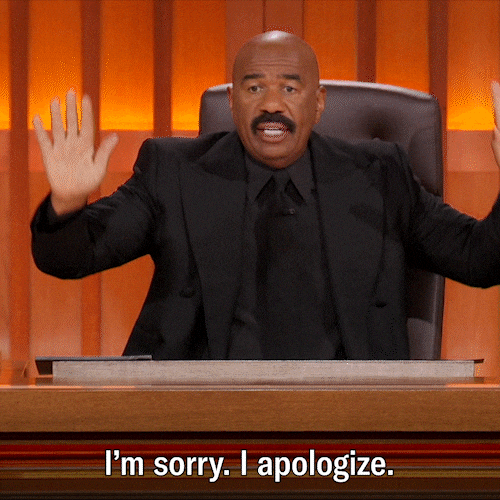 Giphy
GiphyIt’s kind of wild that when you work as a therapist/counselor/coach, a lot of people never really see you as human — and this can include your close relationships. What I mean by that is, it’s almost like they expect you to be free on-call therapy to the point where they “forget” to actually check on you sometimes.
Such is the case with one of my longest-running friendships. Even during the weeks between losing my mother and losing $4K (SMDH), she would just keep calling me to vent about her marriage. I finally got so fed up that I brought it to her attention that for the past couple of years, that is exactly what our friendship has been like: her venting, me listening without her being very invested in my life at all. In response, she texted me an apology — and boy, was it beautiful.
I’m not going to share the details of what she said; however, I am going to tell you three things that it consisted of because it’s what I believe ALL APOLOGIES should entail.
1. She took full ownership for what she believed that she did. I framed this point in this way because, something that everyone needs to forever keep in mind is the fact that two people start and, to a large extent, end relationships — and what I mean by that is, it’s never like one person was perfect and the other was the villain. That said, though, when someone is making an apology to another individual, they are going to own their part and articulate what that part is. It’s not gonna be a simple “My bad.”
It’s going to be “I am really sorry that I wasn’t there for you when you needed me” or “I apologize for taking you for granted” — something that sounds like they get the “offense” that transpired. By doing this, they recognize their missteps — and that is what puts people on the road to not repeating them.
2. She did not deflect or gaslight me. You know what one of the worst apologies are: It’s when someone says they are sorry and then follows it up with, “But you do it too” or “If you hadn’t done ‘A’, I wouldn’t have done ‘B.'” Justifying your actions is a surefire way to make someone believe that you don’t really think that you did something wrong (or that bad) in the first place. And really, how can they trust you (again) if that is how you feel? Oh, and don’t get me on gaslighting.
Ugh, ain’t nothing like someone claiming that they want to set things right with you, only to act like they don’t really get where you are coming from with the issues y’all were having in the first place. A good gaslight line in an apology: “If that is what you think happened, I apologize.” Yeah, you can keep that, jack. Never accept this kind of apology — because it isn’t one.
3. She addressed why she needed to make the apology in the first place. Wanna know one of the main reasons why I don’t trust people who don’t believe in having regrets (check out “Why Regret Might Not Always Be A Bad Thing”)? Did you know that apology means “a written or spoken expression of one's regret, remorse, or sorrow for having insulted, failed, injured, or wronged another.” How, as a human, do you think that you are out here not making any mistakes or poor decisions that you sometimes need to APOLOGIZE for? That is just…insane.
And one of the reasons why apologies are important is because if you feel bad about “failing” someone, it’s usually because you value them enough to want to keep them around. And yes, in my friend’s apology, she also explained why she didn’t want me to feel hurt in the way that she had hurt my feelings and what she would do to prevent that from happening in the first place.
So y’all, with all of this out of the way, before getting deeper into this topic? If an ex is hitting you up to apologize to you for something, please make sure that he hits all three marks of a true apology.
Now let’s keep going.
A Genuine Apology Should Also Include an Amends
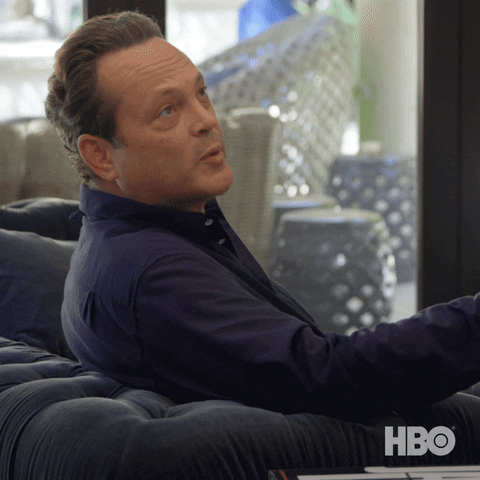 Giphy
GiphyA few years ago, I wrote an article for the platform entitled, “Heads Up: It's NOT An Apology If An Amends Isn't Made.” You know how I mentioned a second ago that a solid apology has no gaslighting in it? Hmph. Ain’t it wild how someone can do something that hurts or harms you and yet, they want you to just “hurry up and get over it”? GASLIGHTING.
Someone in my family, after unpacking years of abuse that I experienced at their hand, they had the nerve to say, “I’m not going to keep apologizing to you for this.” Hmm…Okay. So, how about you let me give you a consistent three months’ worth of the years of mistreatment that I experienced from you and then flippantly throw an apology your way. Let’s see how you feel about it. How much you believe that I am being genuine and sincere.
Listen — and please hear me GOOD on this: when someone really gets the magnitude of the pain or discomfort and inconvenience that they caused, they aren’t going to be fine with just saying that they are sorry for it; they are going to ask you what they can do to set things right.
It’s actually a part of the reason why I named the four children who I aborted (check out “Why I Named The Children I Aborted”) because I do have some real remorse for those decisions. Each of their names have an intentional meaning and I strive to leave out their purpose, through those names, on a daily basis. It’s a small way of making amends.
You know, back when my first book came out, my first love reached out, via email, to send me an apology. The apology hit most of the points that I mentioned earlier. Looking back, there wasn’t an offer to make an amends, though, and trust me, there was A LOT to make up for.
At the end of the day, amends means “reparation or compensation for a loss, damage, or injury of any kind; recompense” and while none of us should use bitterness, resentment or emotional stagnation as the “bar” for which we should expect amends to be made, if you’re trying to figure out just how sincere an ex is with their apology, if they want to do something to make things better, that’s a good sign.
There is a caveat, though.
Discern the Motives. Always.
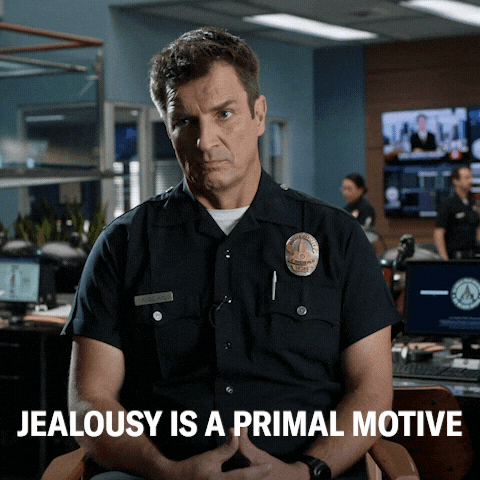 Giphy
GiphyEarlier this summer, I wrote an article for the platform entitled, “What's Your Motive For Sex? (It Reveals A Lot. Trust Me.)” Then, a few weeks ago, I wrote another article entitled, “As Cuffing Season Steadily Approaches, What The Heck Is 'Winter Coating'?” and boy, when I tell you that both of these complement this point really well? Goodness.
If you’ve never heard of the dating trend known as winter coating before, it’s basically when an ex creeps back up around cuffing season — and if you know what cuffing season is all about, you can absolutely connect the very probable motives behind those dots.
Now can there be exceptions? There are ALWAYS exceptions. Still, if you haven’t heard from your ex in years and here he comes a couple of weeks before Christmas, unless the two of you got together or broke up around the holidays, stay on potential “winter coating alert,” because it might not be about “building bridges” so much as getting into your bedroom.
That said, if it’s been a minute (six months or more) since you’ve heard from an ex and he suddenly reaches out to apologize, absolutely take out a moment to discern the motive — and shoot, feel fine with even asking what is causing him to make the move…now. If it’s in the spirit of the holidays and wanting to go into a new year with a clean slate, got it. If it’s because he’s been in therapy and realizes that he didn’t end certain things in his past very well, understood. If it’s because he didn’t like how the two of you broke up and he wants to try and make peace, that’s fair.
On the other hand, if you sense that he wants to rekindle something (check out “Nelly And Ashanti Are Giving It Another Shot? Here's What You Should Know About 'Ex Reconciliation'” and “I'm Thrilled That Ryan Destiny & Keith Powers Are Back Together. 5 Things Before Reuniting With Your Ex, Tho.” and “What Happens When 'The One Who Got Away'...Comes Back?”) — although that’s kind of another article for another time, do check that motive.
When someone apologizes, you should really be the only focus for them; not what they can get out of it on the back end. Listen, even if he hopes to get back with you (or back in bed with you), that shouldn’t be something that is discussed during the apology. If it is said or even implied, something about HIS MOTIVE is disingenuous. And if that is indeed the case, to a valid extent, so is he.
We All Should Give the Grace and Mercy That We Desire
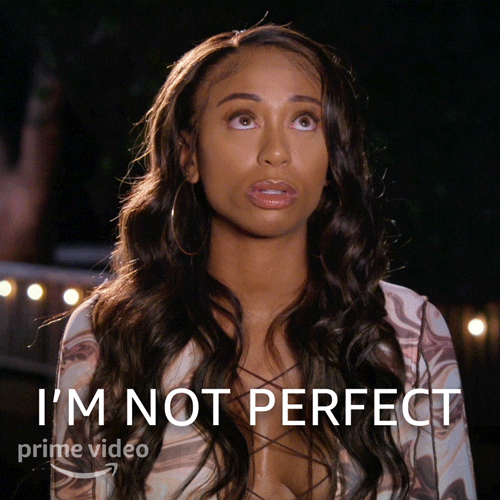 Giphy
GiphySooner than later, I’m going to write an article about forgiveness (beyond what I already have here). For now I’ll just say that if you are someone who thinks that other people don’t deserve forgiveness? That is either your pain or your ego talking and, either way, you can’t trust “their” judgment.
All of us mess up sometimes and if you are a karma (or you reap what you sow) believer, then you absolutely should want to extend others grace and mercy so that you can receive it in your own time of need (and you are absolutely delusional if you think a time won’t come, sooner than you probably think, that you will need it).
Besides, do you know all of the self-inflicted drama and trauma that comes from NOT forgiving others: higher blood pressure, insomnia, stress, anxiety, the higher risk of a heart attack, a weakened immunity, a greater risk for depression and anxiety — whatever he did, is it really worth all of this? Yeah, while a lot of people think that weaponizing forgiveness is empowering, really all it’s doing is putting themselves in harm’s way. Physically. Emotionally. SPIRITUALLY: “For if you forgive men their trespasses, your heavenly Father will also forgive you. But if you do not forgive men their trespasses, neither will your Father forgive your trespasses." (Matthew 6:14-15 — NKJV)
By the way, no one is saying that forgiving that man means that you have to allow him back into your life. After all, access is a privilege. Yet if he comes to you and acknowledges that he feels sorry for some things, for the sake of your own sanity, why not let him express it? Don’t wanna meet up or talk on the phone? Understood. Email and/or text are there for the taking. Don’t want to go back and forth? Who said that it needs to be a discussion or a debate?
All I know is, the more time you spend on this planet, the more you want to put out the energy that you want to come back. Forgiving others tends to make life easier. Not forgiving? Oh, the way that it boomerangs, sometimes in ways you never saw coming, chile. Dodge that kind of experience (and typically hard life lesson) if you can.
Yes, Better Late than Never
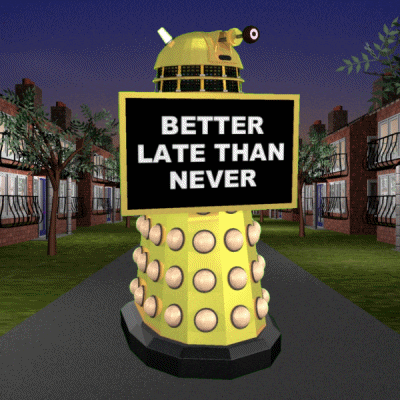 Giphy
GiphyToo late to apologize. Yeah, I don’t really know if there is such a thing (because forgiving and reconciling are not one in the same and some of y’all will catch that later). I’ll wrap this up with a story to prove my point.
Once upon a time, I knew a woman who was in a serious relationship and yet, whenever her boyfriend would bring up the possibility of marriage, she would stall him out. When I finally asked her what her deal was, she explained that she still harbored so much pain from the man before him that she didn’t fully trust that he was the real deal. About five months later, here came her ex with a thorough explanation for why he made some of the decisions that he did while they were together. Now that she had the full story, she was able to heal. She got married to her boyfriend that following year.
You see where I am going with this? Although your ex’s apology might be “late” as far as y’all’s relationship timeline, the timing may be BRILLIANT when it comes to true when and why you actually need it. Yeah, a Scripture that I adore is “Timing is the Father’s business” (Acts 1:7 — Message) and sometimes those apologies, in the grand scheme of things, are more on time than you could ever imagine; they’re when God deems you need them not when you want to have them.
____
It is Oprah Winfrey who once said, “True forgiveness is when you can say, "Thank you for that experience” and sis, if you remove the bitterness and anger and look deeper, there were valuable lessons, even in and from the most challenging relationships. And that is worth appreciating through forgiveness and, if need be, full and complete release.
Bottom line, should you accept an ex’s late apology? Absolutely.
What better way to illuminate your present on a whole ‘nother level.
Just as forgiveness always does.
TRUST ME.
Let’s make things inbox official! Sign up for the xoNecole newsletter for love, wellness, career, and exclusive content delivered straight to your inbox.
Featured image by Shutterstock









